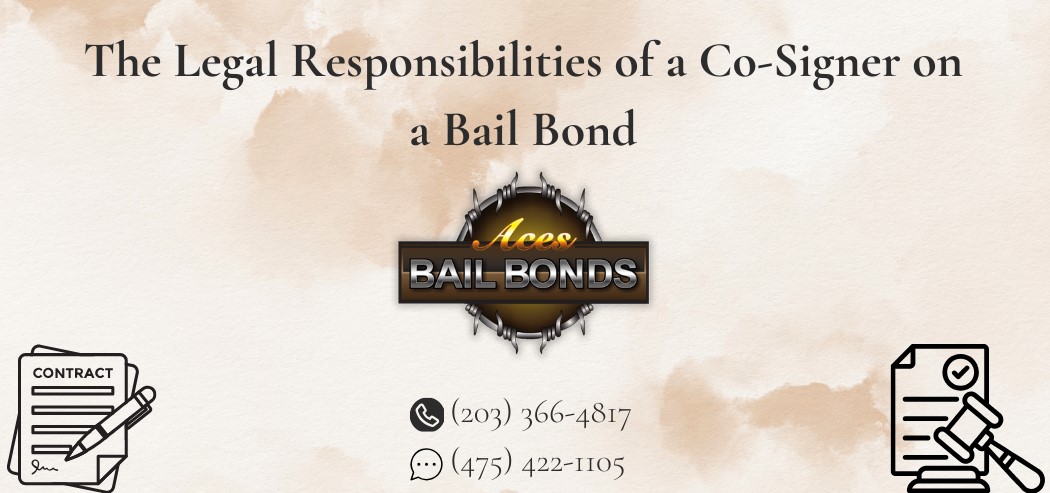The Legal Responsibilities of a Co-Signer on a Bail Bond
Bail bonds are a lifeline for defendants, allowing them to be released from jail while awaiting trial. But posting bail often requires more than just a bail bond agent and the defendant. In many cases, a co-signer—also called an indemnitor—must step in.
Being a co-signer on a bail bond is a serious legal and financial commitment. If you are considering this role, it’s important to understand your obligations, the risks involved, and how to protect yourself.
What Is a Bail Bond Co-Signer?
When a defendant cannot afford bail, they turn to a bail bond company. The bondsman posts bail for a non-refundable fee (usually 10% in Connecticut). To reduce risk, the bondsman often requires a co-signer.
The co-signer agrees to:
-
Ensure the defendant appears in court.
-
Accept financial liability if the defendant skips bail.
-
Provide collateral (cash, property, vehicles, or other assets) if required.
Legal Responsibilities of a Bail Bond Co-Signer
1. Ensuring Court Appearance
Your top responsibility is making sure the defendant shows up for all hearings. If they fail to appear, the court can forfeit the bond, and you could owe the full bail amount.
2. Financial Liability
By signing the bail bond contract, you agree to pay the full bail if the defendant flees. The bail bond company can seize your collateral to cover losses.
3. Covering Additional Costs
If a defendant skips court, recovery efforts may involve:
-
Bounty hunter fees
-
Travel and legal costs
-
Court expenses
As the co-signer, you are legally responsible for these costs.
4. Signing a Legal Contract
The co-signer must sign a binding bail bond agreement. Breaking this agreement can result in legal action and financial loss.
5. Providing Accurate Information
Lying about the defendant’s employment, address, or background can lead to charges of fraud and additional liability.
6. Keeping the Bail Bond Agent Informed
If the defendant changes jobs, addresses, or circumstances, you must notify the bail bond company immediately.
Financial Risks for Co-Signers
Co-signing a bail bond is not just about trust—it’s about risk.
-
Loss of Collateral: Homes, cars, or cash pledged can be seized if the defendant skips bail.
-
Debt and Credit Damage: Unpaid bail amounts or collection efforts can harm your financial standing.
-
Legal Costs: You may need to hire an attorney if disputes arise.
-
Emotional Stress: Constantly monitoring the defendant can create pressure and strain relationships.
How to Protect Yourself as a Co-Signer
-
Vet the Defendant Carefully – Only co-sign for someone you truly trust.
-
Communicate Clearly – Explain the seriousness of court appearances.
-
Understand the Contract – Read every term before signing.
-
Seek Legal Advice – A lawyer can explain your rights and liabilities.
-
Monitor Compliance – Stay aware of the defendant’s location and actions.
-
Set Boundaries – Make sure the defendant understands what’s at stake.
Real-Life Scenarios
-
The Reliable Defendant: A co-signer supports a family member with strong community ties. The defendant attends all hearings, and the process ends smoothly.
-
The High-Risk Defendant: A friend with a history of skipping bail flees. The co-signer loses their car and faces heavy debt.
-
The Unexpected Change: A relative loses their job after release. With support from the co-signer and regular communication, they still meet all court obligations.
Conclusion
Co-signing a bail bond in Connecticut is a serious responsibility with legal and financial consequences. Co-signers guarantee the defendant’s court appearances, accept liability for the full bail amount, and may cover recovery costs if things go wrong.
However, with careful planning, open communication, and a solid understanding of the bail bond agreement, co-signers can reduce risk and help defendants navigate the system.
At Aces Bail Bonds, we provide guidance and support for co-signers and defendants alike. We make sure every co-signer understands their responsibilities before signing, so there are no surprises later.
📞 Need help? Call (203) 344-7483 for trusted Connecticut bail bond services available 24/7.

